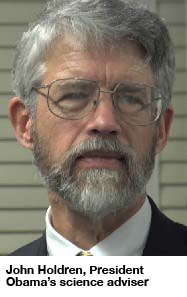This is the first of two postings from the AAAS conference today. To see the second post, click here.
Participants in the American Association for the Advancement of Science‘s annual public policy conference are a lot more upbeat about government support for science now that Barack Obama lives in the White House and Democrats enjoy large majorities in both chambers of Congress.
Meeting today in Washington, D.C., AAAS members heard representatives of the Obama administration and Congress declare the president’s and the legislature’s belief in the importance of science and technology. Outside analysts testified that those declarations are real.
“Our biggest asset in going forward and getting this right is the president’s engagement and enthusiasm with science and technology,” said John Holdren, the president’s science adviser. “This is a president who just lights up when the subject is science and technology, and lights up with increased wattage when the subject is teaching kids and engaging kids in science and technology.

House Science Committee Chairman Rep. Bart Gordon, D-Tenn., confirmed Holdren’s description of the president.
Before Obama moved into the White House, Gordon said, “he gave me a call and he said ‘I’m a science guy.'” As a result, Gordon said, “we’re going to see some changes that we need.”
Albert Teich, director of AAAS’s Science and Policy Programs, said record attendance at this year’s policy conference reflects scientists’ enthusiasm for the new climate in Washington. About 600 registered for the sessions today and tomorrow, more than ever before, he said.
Teich used such words as “huge,” “massive” and “unprecedented” to describe the increases in federal science spending that are being approved for this year and next.
“We’re going to look back at this in future years with our mouths open,” he said. “Future generations are going to look at this as something special.”
Regular appropriations bills and the economic stimulus legislation raised total federal research-and-development spending for 2009 to $172 billion, up from a bit more than $140 billion in 2008, Teich said. Even without the stimulus bill’s impact, he added, every major federal R&D agency received an increase above inflation. Most of those increases exceeded what former President George W. Bush requested.
Final action on the regular 2009 appropriations bills, which normally would have occurred in 2008, was postponed until Congress convened with larger Democratic majorities this year.
Because the stimulus bill supplemented regular appropriations, Teich said, the levels of science spending approved for this year, and expected for 2010, would be difficult to sustain. But, he added, Obama “has really shown that science, technology and innovation are central to the way he wants the country to go.”
Holdren said Obama sees science and technology as essential for economic recovery and growth. The president’s priorities — improving health care, moving toward energy independence, protecting the environment and securing national and homeland security — all have science components, Holdren said.
Obama also is committed to improving science education from pre-kindergarten to post-graduate, he said.
Beyond funding, Obama is moving on other issues important to scientists, Holdren said: assuring scientific integrity in federal activities and fostering international scientific collaborations. In addition to raising government R&D investments, the president is calling on businesses to boost total U.S. R&D spending to at least 3 percent of the gross domestic product. It’s currently about 2.66 percent, Teich said, more than two-thirds financed by the private sector.
Gordon told the scientists they have to help secure public support for science spending.
“You have to help us make the public understand that science is about jobs and the quality of life.”
Sign up for our free e-newsletter.
Are you on Facebook? Become our fan.
Follow us on Twitter.


